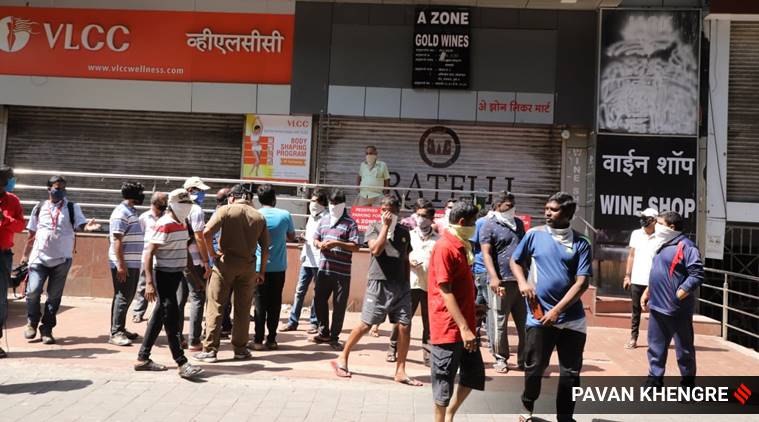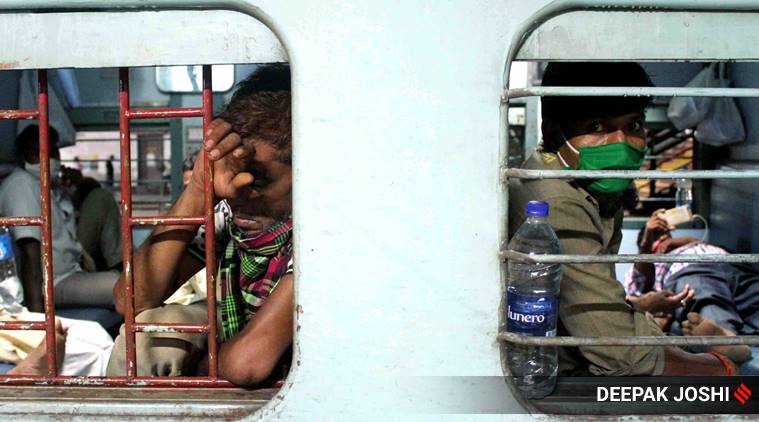 People line up outside a liquor store in Pune
People line up outside a liquor store in Pune
Coronavirus (Covid-19) Tracker India LIVE updates: The second extension of nationwide lockdown with some relaxations in green and orange zones comes into effect from today. The number of cases saw a jump of 2,270 cases to stand at 42,533. Of these, 29,543 are active, while 11,706 are discharged. The death toll stands at 1373.
Congress president Sonia Gandhi on Monday said that the party’s State Congress Committees will bear the ticket expense of the train journey of migrant workers who are being sent back to their homes by various states. “This will be the Indian National Congress’ humble contribution in service of our compatriots and to stand shoulder to shoulder in solidarity with them,” her letter read. Sonia’s letter comes a day after the railways ordered the states to collect train ticket cost from the migrants. In its guidelines published Saturday, Railways said it would hand over the tickets to the originating states and the state would “collect the ticket fare” and hand them over to Railways.
Global coronavirus cases surpassed 3.5 million on Monday, with deaths nearing a quarter of a million, although the rate of fatalities and new cases has slowed from peaks reached last month
 Migrants inside a train in Bhiwandi, Maharashtra. (Express Photo by Deepak Joshi)
Migrants inside a train in Bhiwandi, Maharashtra. (Express Photo by Deepak Joshi)
The challenges confronting the world due to the unprecedented coronavirus pandemic have brought to the fore the inadequacies of the global governance structures, India's former UN envoy Ambassador Syed Akbaruddin has said.
As the world grapples with the health and humanitarian crisis unleashed by the coronavirus, Akbaruddin, who retired on April 30 from the post of India's Permanent Representative to the UN, told PTI the challenges of confronting the global pandemic have brought to the fore the inadequacies of global governance structures. “Retooling to make them fit for the purpose for our times will be required, once the immediate concerns of addressing the multiple crises are addressed. Otherwise the global governance crisis impedes the arrival of the new normal.
“Even while facing unprecedented challenges on the domestic front, India has shown ability to work cooperatively globally with a range of international partners at the regional, plurilateral and multilateral levels in the delivery of global public goods to address the needs of the COVID-19 pandemic,” he said.
The coronavirus pandemic has adversely hit organ transplants in the state, with zero cadaver donations and just three live organ transplants recorded in April. A disruption in these donations has meant a longer wait list for patients requiring organ transplants. While emergency, life-saving surgeries are being performed at hospitals, organ transplants are avoided because fewer donors available, and surgeons do not want to take the risk of exposure.
The novel coronavirus can infect and replicate in cells that line the inside of the human intestines, according to a study that could explain why some patients with COVID-19 experience gastrointestinal symptoms. The finding, published in the journal Science, shows that the intestines are a target organ for the SARS-CoV-2 virus. Studies have shown that the virus enters epithelial cells in the lungs by exploiting an enzyme called ACE2, allowing it to replicate and spread further, according to the researchers, including those from Erasmus Medical Center in the Netherlands. Read more
The number of official Covid deaths in Malegaon in Maharashtra is just 12 since the first case in early April but, overall, the number of deaths in this city has shown an unusual surge. At 580 deaths for April, as per civic records obtained by The Indian Express, it’s almost twice the figure for the same month last year (277) and a 48 per cent jump over the number of deaths in March this year.
Hard pressed to explain this spike — some officials blame the locked-down private hospitals — the state government has decided to randomly test family members of all those who died after April 10. This amid concerns that some of those who have died may have had Covid but went undetected — and could, possibly, have passed on the infection to close contacts. Read more
Scenes from outside liquor stores in Bangalore, Delhi
As India stepped out of the second phase of its lockdown, and into a more relaxed third phase, there were already signs of a surge in the number of novel Coronavirus cases in the country. With the lid now off in many places, and significantly loosened even in some of the worst affected areas like Mumbai and Pune, India could see a rapid rise in the infection numbers, which in any case, were increasing by record margins every day for the last four days.
By the end of day on Sunday, the total number of confirmed cases in India had reached over 42,500. At the start of the lockdown on the midnight of March 24, India had just 525 cases. And while the six intervening weeks seems to have done little to prevent the spread of the virus, the fact is that the numbers could have been multiple times higher in the absence of the lockdown.
The Centre has allowed sale of liquor across the country, even as it extended the lockdown period for two more weeks beginning today. The sale of liquor is part of the overall opening of economic activity that the government is attempting in the third phase of the lockdown, and is expected to earn states much-needed revenue. But will liquor now be freely available, or will there still be some restrictions? Will all liquor stores now open?
Remdesivir has been given emergency approval for COVID-19 treatment in the US, even as a new study casts doubts over its efficacy. Remdesivir is designed to obstruct the stage of replication, when the virus creates copies of itself, followed endlessly by the copies creating copies of themselves. Research last month concluded that remdesivir indeed works this way, and a new paper last week described the exact mechanism of interaction between the virus and the drug. What is it about remdesivir that holds promise, and why is it debated? We explain
Coronavirus test kits used in Tanzania were dismissed as faulty by President John Magufuli on Sunday, because he said they had returned positive results on samples taken from a goat and a pawpaw.
Magufuli, whose government has already drawn criticism for being secretive about the coronavirus outbreak and has previously asked Tanzanians to pray the coronavirus away, said the kits had “technical errors”. The COVID-19 testing kits had been imported from abroad, Magufuli said during an event in Chato in the north west of Tanzania, although he did not give further details.
After Sonia Gandhi announced that Congress will bear the migrants' train ticket fares, Congress leader Rahul Gandhi in a tweet in Hindi said, :On the one hand, the Railways is charging ticket fares from labourers stranded in other states, while on the other hand, the Railway Ministry is donating Rs 151 crore to the PM-Cares Fund. Just resolve this puzzle."
So as India starts Lockdown 3.0, albeit with some relaxations, the main question facing the economy is: When will the government announce a relief package? That’s because, with each passing week, the economy is moving from job losses of individuals to the financial ruin of firms. If the government does not provide a safety net to smaller firms, especially those that were running fine before the Covid-19 induced lockdowns ruined them, then the economic distress will continue to deepen and likely become insurmountable in the future. Here’s hoping that the government’s relief package is only a question of when, and not if, writes Udit Mishra. Read here
Kashmiri students waiting in queue for registration to go back at their native states, in Kharar, Mohali, Punjab (Express photo by Jasbir Malhi)
The second extension of nationwide lockdown with some relaxations in green and orange zones comes into effect from today. The number of cases saw a jump of 2,270 cases to stand at 42,533. Of these, 29,543 are active, while 11,706 are discharged. The death toll stands at 1373
Global coronavirus cases surpassed 3.5 million on Monday, with deaths nearing a quarter of a million, although the rate of fatalities and new cases has slowed from peaks reached last month
Congress leader Sonia Gandhi on Monday said that the party workers across State Congress Committee will bear the ticket expense of the train journey of migrant workers who are being sent back to their homes by various states. In a letter to the party workers, the interim party chief said that the party will also take necessary steps in this regard. “This will be the Indian National Congress’ humble contribution in service of our compatriots and to stand shoulder to shoulder in solidarity with them,” her letter read.
Here's what's making news in India
Good morning! Welcome to our live blog on coronavirus. The confirmed cases in India climbed to 40,200, while 1,306 people have died. Globally, there are over 3.5 million confirmed cases. Follow this space to track the latest and most important developments from across the globe
As cumulative coronavirus cases in UP crossed 2,500 on Sunday, the day also marked one of the steepest 24-hour surges with 139 fresh cases being reported from several districts. Notably, the latest jump of 500 has come in six days, a slight fall from the last two 500 jumps, which took five and four days, respectively. Read more here
From Monday, liquor shops, electronic stores, mobile phone stores and stationary shops will be allowed to reopen in Mumbai and Pune, the Maharashtra government announced on Sunday. The state, however, capped the total number of “non-essential” and “standalone” shops that can reopen on any lane, street or road to a maximum of five, and that too only outside containment zones in these metropolitan areas.
The new order released by the state government on Sunday stated: “All standalone (single) shops, neighbourhood (colony) shops and shops in residential complexes, without any distinction of essential and non-essential, are permitted to remain open in urban areas excluding containment zones.” Read more here
On Sunday, 33-year-old microbiology lab technician Ramchandra Seth watched as a helicopter showered flowers over the Rajendra Institute of Medical Sciences (RIMS), a COVID-19 centre here. The gesture of solidarity seemed lost on Seth as he battled his emotions — his colleague tested a few days ago. Seth is one of the 18 “outsourced” lab technicians at RIMS. They studied paramedics at the institute and joined the hospital as temporary technicians due to lack of other jobs, and later wrote the examination for a permanent seat in the hospital and got selected. However, several months later, Seth is yet to be appointed. Worse still, he has not been paid for two months.
There are currently 30 technicians—permanent and outsourced–working in the micro-biology department in two shifts. They play an important role in “collecting information, sampling, testing, reporting, documenting medical investigation” among others.